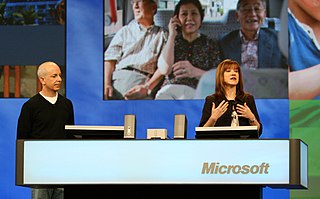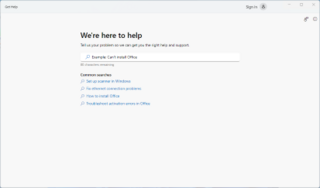Related Research Articles
Microsoft Windows was announced by Bill Gates on November 10, 1983. Microsoft introduced Windows as a graphical user interface for MS-DOS, which had been introduced two years earlier. The product line evolved in the 1990s from an operating environment into a fully complete, modern operating system over two lines of development, each with their own separate codebase.
Microsoft Windows is a group of several proprietary graphical operating system families developed and marketed by Microsoft. Each family caters to a certain sector of the computing industry. For instance, Windows NT for consumer and corporate desktops, Windows Server for servers, and Windows IoT for embedded systems. Defunct Windows families include Windows 9x, Windows Mobile, Windows Phone, and Windows Embedded Compact.

Microsoft XNA is a freeware set of tools with a managed runtime environment that Microsoft developed to facilitate video game development. XNA is based on .NET Framework, with versions that run on Windows and Xbox 360. XNA Game Studio can help develop XNA games. The XNA toolset was announced on March 24, 2004, at the Game Developers Conference in San Jose, California. A first Community Technology Preview of XNA Build was released on March 14, 2006.
Microsoft Configuration Manager (ConfigMgr) is a systems management software product developed by Microsoft for managing large groups of computers providing remote control, patch management, software distribution, operating system deployment, and hardware and software inventory. Configuration Manager supports the Microsoft Windows and Windows Embedded operating systems. Previous versions also supported macOS (OS X), Linux or UNIX, as well as Windows Phone, Symbian, iOS and Android mobile operating systems.

In computing, XCOPY is a command used on IBM PC DOS, MS-DOS, IBM OS/2, Microsoft Windows, FreeDOS, ReactOS, and related operating systems for copying multiple files or entire directory trees from one directory to another and for copying files across a network.
Microsoft SQL Server Data Engine is a relational database management system developed by Microsoft. It is a scaled-down version of Microsoft SQL Server 7.0 or 2000 which is free for non-commercial use as well as certain limited commercial use. It was introduced at Microsoft TechEd in May 1999, and was included as part of Microsoft Office 2000 Developer Edition. Its successor, SQL Server Express was released in November 2005. Vendor support of MSDE ended on April 8, 2008.
Microsoft Servers is a discontinued brand that encompasses Microsoft software products for server computers. This includes the Windows Server editions of the Microsoft Windows operating system, as well as products targeted at the wider business market. Microsoft has since replaced this brand with Microsoft Azure, Microsoft 365 and Windows 365.

Microsoft Corporation is a multinational corporation based in Redmond, Washington, USA and founded by Bill Gates and Paul Allen that develops, manufactures, licenses, and supports a wide range of products and services predominantly related to computing. Due to the scope and size of the company, it encompasses a broad range of topics mostly revolving around critical analysis and the company's products and services.

Microsoft's Professional Developers Conference (PDC) was a series of conferences for software developers; the conference was held infrequently to coincide with beta releases of the Windows operating system, and showcased topics of interest to those developing hardware and software for the new version of Windows.

File Manager is a file manager program bundled with releases of OS/2 and Microsoft Windows between 1988 and 1999 and available from 6 April 2018 as an optional download for all modern releases of Windows, including Windows 10.
Microsoft is a multinational computer technology corporation. Microsoft was founded on April 4, 1975, by Bill Gates and Paul Allen in Albuquerque, New Mexico. Its current best-selling products are the Microsoft Windows operating system; Microsoft Office, a suite of productivity software; Xbox, a line of entertainment of games, music, and video; Bing, a line of search engines; and Microsoft Azure, a cloud services platform.
Microsoft engineering groups are the operating divisions of Microsoft. Starting in April 2002, Microsoft organised itself into seven groups, each an independent financial entity. In September 2005, Microsoft announced a reorganization of its then seven groups into three. In July 2013, Microsoft announced another reorganization into five engineering groups and six corporate affairs groups. A year later, in June 2015, Microsoft reformed into three engineering groups. In September 2016, a new group was created to focus on artificial intelligence and research. On March 29, 2018, a new structure merged all of these into three.
Microsoft PowerToys is a set of freeware system utilities designed for power users developed by Microsoft for use on the Windows operating system. These programs add or change features to maximize productivity or add more customization. PowerToys are available for Windows 95, Windows XP, Windows 10 and Windows 11. The PowerToys for Windows 10 and Windows 11 are free and open-source software licensed under the MIT License and hosted on GitHub.
Azure DevOps Server is a Microsoft product that provides version control, reporting, requirements management, project management, automated builds, testing and release management capabilities. It covers the entire application lifecycle and enables DevOps capabilities. Azure DevOps can be used as a back-end to numerous integrated development environments (IDEs) but is tailored for Microsoft Visual Studio and Eclipse on all platforms.

Microsoft Azure, often referred to as Azure, is a cloud computing platform run by Microsoft. It offers access, management, and the development of applications and services through global data centers. It also provides a range of capabilities, including software as a service (SaaS), platform as a service (PaaS), and infrastructure as a service (IaaS). Microsoft Azure supports many programming languages, tools, and frameworks, including Microsoft-specific and third-party software and systems.

Kinect is a line of motion sensing input devices produced by Microsoft and first released in 2010. The devices generally contain RGB cameras, and infrared projectors and detectors that map depth through either structured light or time of flight calculations, which can in turn be used to perform real-time gesture recognition and body skeletal detection, among other capabilities. They also contain microphones that can be used for speech recognition and voice control.
A Microsoft account or MSA is a single sign-on personal user account for Microsoft customers to log in to consumer Microsoft services, devices running on one of Microsoft's current operating systems, and Microsoft application software.

Microsoft Build is an annual conference event held by Microsoft, aimed at software engineers and web developers using Windows, Microsoft Azure and other Microsoft technologies. First held in 2011, it serves as a successor for Microsoft's previous developer events, the Professional Developers Conference and MIX. The attendee price was (US)$2,195 in 2016, up from $2,095 in 2015. It sold out quickly, within one minute of the registration site opening in 2016.

Get Help, known as Contact Support before the Windows 10 Creators Update, is a built-in interface for communicating with Microsoft customer service employees over the Internet. The opening screen requests that the user specify a product and explain a problem with it. It also offers the user links to online help articles for business and IT support, Microsoft Store sales and support, and a disability answer desk.
Microsoft, a technology company historically known for its opposition to the open source software paradigm, turned to embrace the approach in the 2010s. From the 1970s through 2000s under CEOs Bill Gates and Steve Ballmer, Microsoft viewed the community creation and sharing of communal code, later to be known as free and open source software, as a threat to its business, and both executives spoke negatively against it. In the 2010s, as the industry turned towards cloud, embedded, and mobile computing—technologies powered by open source advances—CEO Satya Nadella led Microsoft towards open source adoption although Microsoft's traditional Windows business continued to grow throughout this period generating revenues of 26.8 billion in the third quarter of 2018, while Microsoft's Azure cloud revenues nearly doubled.
References
- ↑ nathansobo (2014-02-26). "Introducing Atom". Atom Blog. Retrieved 2020-05-03.
- ↑ "GitHub Desktop". GitHub Desktop. Retrieved 2020-04-15.
- ↑ "GitHub CoPilot". GitHub CoPilot. Retrieved 2021-06-29.
- ↑ "npm has joined GitHub". The GitHub Blog. 2020-04-15. Retrieved 2020-05-03.
- ↑ "Spectrum is joining GitHub! · Spectrum Support". Spectrum. 2018-11-30. Retrieved 2020-09-29.
- ↑ TASC (The AppleSoft Compiler) Manual (1981)
- ↑ Bass, Dina (September 21, 2020). "Microsoft to Buy Bethesda for $7.5 Billion to Boost Xbox". bloomberg.com. Retrieved September 22, 2020.
- ↑ "Microsoft acquires Fallout creator Bethesda". BBC News. 2020-09-21. Retrieved 2020-09-21.